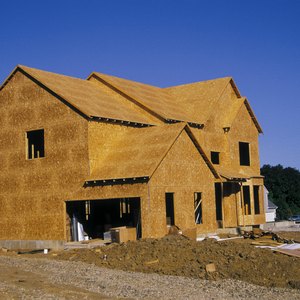
Looking for raw land to develop is an exciting venture, but don't make the mistake of buying land that is unsuitable for building houses. There are many factors that could prevent you from building houses on a piece of land that range from zoning restrictions to unstable soils. Before buying, verify that the site is suitable. You can overcome many obstacles for developing a site, but in some cases doing so is too expensive to make it worthwhile.
Check the current zoning of the land with the local land use department. You can also find this information by locating the property on a map via the county Geographic Information System (GIS) if it is available. If the land is not zoned residential, you will have to apply for a zoning change or a variance. This can be a time consuming and costly process that may require you to hire a real estate attorney. Consider the feasibility of successfully changing the zoning by looking at other zoning cases for similar parcels of land.
Determine if there are any other restrictions on the land in the form of covenants or easements. Ask the seller if there are any restrictive covenants that dictate how the land can be developed. Verify this information by checking the property deed.
Inspect the land for any defects. Such defects that could impair your ability to build houses on the site include toxic waste or buried tanks. These will require expensive clean up before you can convert the parcel to residential use. Disclosure laws vary from state to state, so it is important to verify on your own that the land is free of any environmental contaminants. Another defect that affects your ability to build on a site is the soil quality. Poor soil can cause homes to shift or sink overtime, causing a crack in the foundation or worse.
Calculate the cost of connecting to public utilities such as sewer, electrical, gas and water. If the land is too remote, these expenses may be prohibitive. The county may also require stormwater controls, which can also be costly. If you do not intend to connect the houses to public utilities such as sewer or water, you must ensure that there is access to water on the land, as well as a suitable sites for septic tanks.
Tips
Seek assistance from a real estate agent, home builder or appraiser who is local to the area where you are buying the land. They will be familiar with any rezoning issues and other development issues you may encounter.
References
- Wall Street journal - How Raw Land Becomes a Lot
- BuildingAdvisor.com - Buying Land--Disclosure of Defects
- New York Times - Avoiding Pitfalls in Buying Raw Land
- Sacramento County. “Sacramento County Zoning Code,” Pages 2-4. Accessed Feb. 19, 2020.
- Consumer Financial Protection Bureau. ”What Is Owner's Title Insurance?“ Accessed Feb. 19, 2020.
- RE/MAX. “How Much Land Do You Need to Build a House?” Accessed Feb. 19, 2020.
- Nolo. “Qualifying for a Loan to Buy Vacant Land.” Accessed Feb. 19, 2020.
- LendingTree. “How to Get a Land Loan: Everything a Buyer Needs to Know.” Accessed Feb. 19, 2020.
- Chase. “Should I Buy or Build House?” Accessed Feb. 19, 2020.
- National Association of Home Builders. “Cost of Constructing a Home.” Accessed Feb. 13, 2020.
Tips
- Seek assistance from a real estate agent, home builder or appraiser who is local to the area where you are buying the land. They will be familiar with any rezoning issues and other development issues you may encounter.
Writer Bio
Currently living in Austin, Texas, Alexander Harris is a business journalist covering the self storage industry for SpareFoot.com and SelfStorage.com. Harris previously wrote daily news for RichmondBizSense.com, a business journal in his hometown of Richmond, Va. His work has appeared in various other publications including "Philadelphia Citypaper," Stateline.org, "RVA Magazine" and the "Virginian-Pilot." Harris holds a mass communications degree from Virginia Commonwealth University.

